A Quote by Elif Batuman
I've been thinking a lot about why it was so important to me to do The Idiot as a novel, and not a memoir. One reason is the great love of novels that I keep droning on about. I've always loved reading novels. I've wanted to write novels since I was little. I started my first novel when I was seven.I don't have the same connection to memoir or nonfiction or essays. Writing nonfiction makes me feel a little bit as if I'm producing a product I don't consume - it's a really alienating feeling.
Quote Topics
About
Always
Been
Bit
Connection
Consume
Essays
Feel
Feeling
First
Great
Great Love
Idiot
Important
Keep
Little
Little Bit
Lot
Love
Loved
Makes
Me
Memoir
Nonfiction
Novel
Novels
Producing
Product
Reading
Reading Novels
Really
Reason
Same
Seven
Since
Started
Thinking
Wanted
Why
Write
Writing
Writing Nonfiction
Related Quotes
Lately I've been thinking about the idea that all novels are, at least in some way, about the process of writing a novel - that the construction of the book and the lineage of people constructing novels are always part of the story the author is telling. I think the equivalent for memoir should be that all memoirs are, in some way, about the process of memory. Memoirs are made out of a confusing, flawed act of creation.
Why do I like to write short stories? Well, I certainly didn't intend to. I was going to write a novel. And still! I still come up with ideas for novels. And I even start novels. But something happens to them. They break up. I look at what I really want to do with the material, and it never turns out to be a novel.
If you're writing a book where you want to make a positive truth claim, then you should absolutely call it nonfiction or memoir. If you don't want to make that claim - if that's not what's important to you; if you're more interested in storytelling and interiority and interpersonal relationships than in objective, checkable facts about the world - then why wouldn't you call it a novel, and take advantage of what that gets you, of the extra freedom, of belonging to the tradition of the novel?
Fiction allows us to see the world from the point of view of someone else and there has been quite a lot of neurological research that shows reading novels is actually good for you. It embeds you in society and makes you think about other people. People are certainly better at all sorts of things if they can hold a novel in their heads. It is quite a skill, but if you can't do it then you're missing out on something in life. I think you can tell, when you meet someone, whether they read novels or not. There is some little hollowness if they don't.
Novels are completed when they are finished, but the memoir changes its own conclusion by virtue of being written... I was not at all the same person, when I handed the manuscript to the publisher, as I had been when I began. A memoir may always be retrospective, but the past is not where its action takes place.
I don't remember reading much at all during the writing of Eileen. I go through several years-long dry spells and I don't feel like reading at all. I was working part-time for a guy in Venice, California while I drafted Eileen. He wanted help in writing his memoir. The research had a lot to do with the 60s, so that must have informed my sense of the place and time in my novel, and perhaps even the memoir point-of-view. He was also from New England. It was a fun job. I learned a lot about motorcycle clubs, Charles Manson, hopping freight trains.
I think the term "artist's novel" for me has referred to writing which supports an art practice or a more specifically a particular artwork or project. The nonfiction novellas and nonfiction novel I have written play a role in my artwork as objects - which I will return to, but I write the books to exist autonomously.
In Pakistan, many of the young people read novels because in the novels, not just my novels but the novels of many other Pakistani writers, they encounter ideas, notions, ways of thinking about the world, thinking about their society that are different. And fiction functions in a countercultural way as it does in America and certainly as it did in the, you know, '60s.































